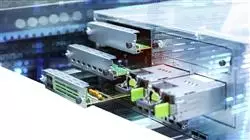University certificate
The world's largest faculty of information technology”
Introduction to the Program
Become an expert in cybersecurity and management of Cloud Infrastructures with a 100% online mode and total time freedom”

With the emergence of new technologies, the Internet and the incalculable advances that have been taking place, many companies had to renew themselves, going through processes of change in which digitization and transformation at all levels were vital. But now, the time has come for the adoption of Cloud Infrastructures, which is considered a key piece in the evolution of the European Union, which is expected to drive a growth of more than 14% of GDP in the coming years.
Cloud Infrastructures guarantee much greater agility, efficiency and cost reduction than conventional physical structures. They allow DevOps teams to implement the infrastructure programmatically, as part of the code of an application, and represent a breakthrough in terms of security, quality control and disaster recovery. In short, they are the best way to balance the needs of today with the opportunities of tomorrow. As a result, the demand for professional experts in implementation and management of Cloud Infrastructures continues to increase, making this area one of the areas with the greatest potential in the labor market.
This is the reason why TECH has created a Masters Degree in Cloud Infrastructures, so that those students who seek to assume a professional future in this sector, enhance their skills and deepen their knowledge. In this way, they will develop the ability to perform their work with the highest possible quality and efficiency, and this through a syllabus that addresses subjects such as implementation models of Cloud Computing, digital transformation, cloud computing resources, storage, Networking, monitoring services or cybersecurity in Cloud Infrastructures, among many other relevant aspects.
Students will be able to combine this program with their professional and personal life, thanks to a 100% online study mode, without any time constraints. In addition, students will be able to access all the main content and a wide variety of additional material from any electronic device with an internet connection. This, together with the most complete multimedia content, up-to-date information and the most innovative tools possible, is a unique opportunity in the educational market.
Quickly stand out in a booming industry and achieve your most demanding IT goals”
This Masters Degree in Cloud Infrastructures contains the most complete and up-to-date program on the market. The most important features include:
- The development of practical cases presented by experts in Cloud Infrastructures for
- The graphic, schematic, and practical contents with which they are created, provide practical information on the disciplines that are essential for professional practice
- Practical exercises where self-assessment can be used to improve learning
- Its special emphasis on innovative methodologies
- Theoretical lessons, questions to the expert, debate forums on controversial topics, and individual reflection assignments
- Content that is accessible from any fixed or portable electronic device with an Internet connection
Put your acquired skills into practice with a variety of activities and case studies supervised by leading Cloud and cybersecurity experts”
The program’s teaching staff includes professionals from sector who contribute their work experience to this educational program, as well as renowned specialists from leading societies and prestigious universities.
Its multimedia content, developed with the latest educational technology, will provide the professional with situated and contextual learning, i.e., a simulated environment that will provide an immersive education programmed to learn in real situations.
This program is designed around Problem-Based Learning, whereby the professional must try to solve the different professional practice situations that arise throughout the program. This will be done with the help of an innovative system of interactive videos made by renowned experts.
Delve into vulnerability analysis in Cloud environments and multiply your chances of sucess in the workplace"

Thanks to TECH you will gain new skills in Virtual Desktop Infrastructure and continuous improvement in Cloud Infrastructures"
Why study at TECH?
TECH is the world’s largest online university. With an impressive catalog of more than 14,000 university programs available in 11 languages, it is positioned as a leader in employability, with a 99% job placement rate. In addition, it relies on an enormous faculty of more than 6,000 professors of the highest international renown.

Study at the world's largest online university and guarantee your professional success. The future starts at TECH”
The world’s best online university according to FORBES
The prestigious Forbes magazine, specialized in business and finance, has highlighted TECH as “the world's best online university” This is what they have recently stated in an article in their digital edition in which they echo the success story of this institution, “thanks to the academic offer it provides, the selection of its teaching staff, and an innovative learning method aimed at educating the professionals of the future”
A revolutionary study method, a cutting-edge faculty and a practical focus: the key to TECH's success.
The most complete study plans on the university scene
TECH offers the most complete study plans on the university scene, with syllabuses that cover fundamental concepts and, at the same time, the main scientific advances in their specific scientific areas. In addition, these programs are continuously being updated to guarantee students the academic vanguard and the most in-demand professional skills. In this way, the university's qualifications provide its graduates with a significant advantage to propel their careers to success.
TECH offers the most comprehensive and intensive study plans on the current university scene.
A world-class teaching staff
TECH's teaching staff is made up of more than 6,000 professors with the highest international recognition. Professors, researchers and top executives of multinational companies, including Isaiah Covington, performance coach of the Boston Celtics; Magda Romanska, principal investigator at Harvard MetaLAB; Ignacio Wistumba, chairman of the department of translational molecular pathology at MD Anderson Cancer Center; and D.W. Pine, creative director of TIME magazine, among others.
Internationally renowned experts, specialized in different branches of Health, Technology, Communication and Business, form part of the TECH faculty.
A unique learning method
TECH is the first university to use Relearning in all its programs. It is the best online learning methodology, accredited with international teaching quality certifications, provided by prestigious educational agencies. In addition, this disruptive educational model is complemented with the “Case Method”, thereby setting up a unique online teaching strategy. Innovative teaching resources are also implemented, including detailed videos, infographics and interactive summaries.
TECH combines Relearning and the Case Method in all its university programs to guarantee excellent theoretical and practical learning, studying whenever and wherever you want.
The world's largest online university
TECH is the world’s largest online university. We are the largest educational institution, with the best and widest online educational catalog, one hundred percent online and covering the vast majority of areas of knowledge. We offer a large selection of our own degrees and accredited online undergraduate and postgraduate degrees. In total, more than 14,000 university degrees, in eleven different languages, make us the largest educational largest in the world.
TECH has the world's most extensive catalog of academic and official programs, available in more than 11 languages.
Google Premier Partner
The American technology giant has awarded TECH the Google Google Premier Partner badge. This award, which is only available to 3% of the world's companies, highlights the efficient, flexible and tailored experience that this university provides to students. The recognition as a Google Premier Partner not only accredits the maximum rigor, performance and investment in TECH's digital infrastructures, but also places this university as one of the world's leading technology companies.
Google has positioned TECH in the top 3% of the world's most important technology companies by awarding it its Google Premier Partner badge.
The official online university of the NBA
TECH is the official online university of the NBA. Thanks to our agreement with the biggest league in basketball, we offer our students exclusive university programs, as well as a wide variety of educational resources focused on the business of the league and other areas of the sports industry. Each program is made up of a uniquely designed syllabus and features exceptional guest hosts: professionals with a distinguished sports background who will offer their expertise on the most relevant topics.
TECH has been selected by the NBA, the world's top basketball league, as its official online university.
The top-rated university by its students
Students have positioned TECH as the world's top-rated university on the main review websites, with a highest rating of 4.9 out of 5, obtained from more than 1,000 reviews. These results consolidate TECH as the benchmark university institution at an international level, reflecting the excellence and positive impact of its educational model.” reflecting the excellence and positive impact of its educational model.”
TECH is the world’s top-rated university by its students.
Leaders in employability
TECH has managed to become the leading university in employability. 99% of its students obtain jobs in the academic field they have studied, within one year of completing any of the university's programs. A similar number achieve immediate career enhancement. All this thanks to a study methodology that bases its effectiveness on the acquisition of practical skills, which are absolutely necessary for professional development.
99% of TECH graduates find a job within a year of completing their studies.
Master's Degree in Cloud Infrastructures
If you’re looking for a cutting-edge postgraduate program in the field of computer science, TECH Global University offers the Master's Degree in Cloud Infrastructures, taught in a virtual format. The cloud infrastructure market is constantly growing and evolving. According to Statista, spending on cloud infrastructure services is expected to reach $240 billion in the coming years, highlighting the increasing demand and opportunities in this field. One of the standout advantages of studying online at TECH is the flexibility provided by the virtual format. Students have the ability to adjust their study schedule to fit their personal and professional commitments, enabling them to progress in their education without sacrificing work or personal life. Additionally, online study allows access to up-to-date study materials and the use of innovative digital tools to enhance content comprehension.
Study a postgraduate degree in cloud infrastructures
This Master's Degree will give you access to specialized and up-to-date resources on the latest trends in cloud computing. You will learn key concepts such as cloud infrastructure architecture, virtualization, cloud storage, security, and cloud service management. Our program focuses on the design, implementation, and management of cloud infrastructures, providing you with the technical and strategic skills needed to lead cloud infrastructure projects in various business environments. You will also learn best practices for implementing and managing cloud services, allowing you to stay at the forefront of this ever-evolving field. Interested in the exciting world of cloud infrastructures? TECH Global University’s Master’s Degree is an excellent study option. With our flexible online approach, academic quality, and access to specialized resources, we offer a comprehensive learning experience. Enroll today and get ready to lead innovative projects in cloud computing with TECH!







